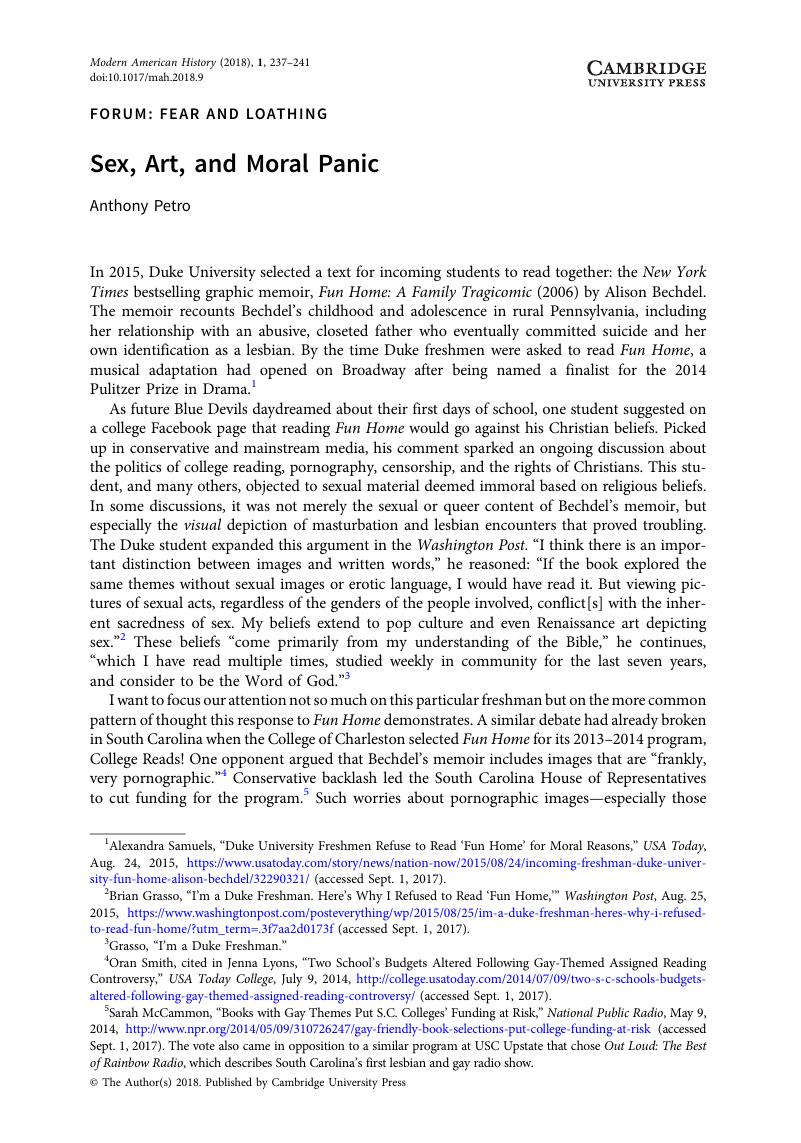Published online by Cambridge University Press: 19 April 2018

1 Alexandra Samuels, “Duke University Freshmen Refuse to Read ‘Fun Home’ for Moral Reasons,” USA Today, Aug. 24, 2015, https://www.usatoday.com/story/news/nation-now/2015/08/24/incoming-freshman-duke-university-fun-home-alison-bechdel/32290321/ (accessed Sept. 1, 2017).
2 Brian Grasso, “I'm a Duke Freshman. Here's Why I Refused to Read ‘Fun Home,’” Washington Post, Aug. 25, 2015, https://www.washingtonpost.com/posteverything/wp/2015/08/25/im-a-duke-freshman-heres-why-i-refused-to-read-fun-home/?utm_term=.3f7aa2d0173f (accessed Sept. 1, 2017).
3 Grasso, “I'm a Duke Freshman.”
4 Oran Smith, cited in Jenna Lyons, “Two School's Budgets Altered Following Gay-Themed Assigned Reading Controversy,” USA Today College, July 9, 2014, http://college.usatoday.com/2014/07/09/two-s-c-schools-budgets-altered-following-gay-themed-assigned-reading-controversy/ (accessed Sept. 1, 2017).
5 Sarah McCammon, “Books with Gay Themes Put S.C. Colleges' Funding at Risk,” National Public Radio, May 9, 2014, http://www.npr.org/2014/05/09/310726247/gay-friendly-book-selections-put-college-funding-at-risk (accessed Sept. 1, 2017). The vote also came in opposition to a similar program at USC Upstate that chose Out Loud: The Best of Rainbow Radio, which describes South Carolina's first lesbian and gay radio show.
6 See Dubin, Steven C., Arresting Images: Impolitic Art and Uncivil Actions (New York, 1992)Google Scholar.
7 Hofstadter first discussed this “paranoid style” in a 1964 Harper's essay and then expanded upon it in the title essay of his now-canonical book. See Richard Hofstadter, “The Paranoid Style in American Politics,” Harper's Magazine, Nov. 1964, 77–86; and Hofstadter, Richard, The Paranoid Style in American Politics (1964; New York, 2008)Google Scholar.
8 Hofstadter, “The Paranoid Style in American Politics,” 77.
9 Cohen, Stanley, Folk Devils and Moral Panics (1972; New York, 2011)Google Scholar.
10 For instance, see Lancaster, Roger N., Sex Panic and the Punitive State (Berkeley, CA, 2011)CrossRefGoogle Scholar; Laycock, Joseph, Dangerous Games: What the Moral Panic over Role-Playing Games Says about Play, Religion, and Imagined Worlds (Berkeley, CA, 2015)Google Scholar; and Patton, Cindy, Sex and Germs: The Politics of AIDS (Boston, 1985)Google Scholar.
11 Carr, Cynthia, Fire in the Belly: The Life and Times of David Wojnarowicz (New York, 2012)Google Scholar.
12 Wojnarowicz, David, “Postcards from America: X-Rays from Hell,” in Close to the Knives: A Memoir of Disintegration (London, 1992), 111–23Google Scholar, here 114.
13 National Endowment for the Arts, “Fact Sheet on American Family Association Fundraising Advertisement,” Feb. 13, 1990, in Culture Wars: Documents from the Recent Controversies in the Arts, ed. Richard Bolton (New York, 1992), 152–3, here 153.
14 Wojnarowicz v. American Family Association, 745 F. Supp 130 (1990).
15 “Bullying and Censorship,” New York Times, Dec. 6, 2010, http://www.nytimes.com/2010/12/07/opinion/07tue4.html?mcubz=3 (accessed Sept. 1, 2017); Holland Cotter, “As Ants Crawl Over Crucifix, Dead Artist Is Assailed Again,” New York Times, Dec. 6, 2010, http://www.nytimes.com/2010/12/11/arts/design/11ants.html?mcubz=3 (accessed Sept. 1, 2017).
16 The often-cited line about pornography that “I know it when I see it” is from Jacobellis v. Ohio. 378 U.S., 197 (Stewart, J., concurring).
17 Sedgwick, Eve Kosofsky, Touching Feeling: Affect, Pedagogy, Performativity (Durham, NC, 2003), 123–52Google Scholar.
18 See Knust, Jennifer Wright, Unprotected Texts: The Bible's Surprising Contradictions about Sex and Desire (New York, 2011)Google Scholar.
19 Bynum, Caroline Walker, “The Body of Christ in the Later Middle Ages: A Reply to Leo Steinberg,” Renaissance Quarterly 39, no. 3 (Autumn 1986): 399–439CrossRefGoogle Scholar.
20 Bynum, “The Body of Christ,” 438.